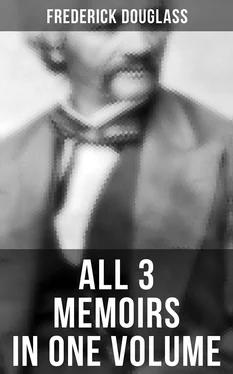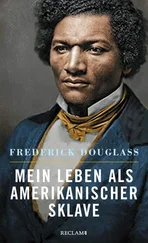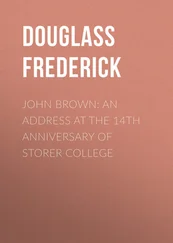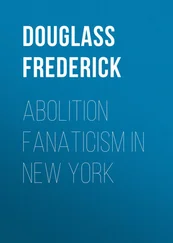It is certainly a very remarkable fact, that one of the most efficient advocates of the slave population, now before the public, is a fugitive slave, in the person of Frederick Douglass ; and that the free colored population of the United States are as ably represented by one of their own number, in the person of Charles Lenox Remond , whose eloquent appeals have extorted the highest applause of multitudes on both sides of the Atlantic. Let the calumniators of the colored race despise themselves for their baseness and illiberality of spirit, and henceforth cease to talk of the natural inferiority of those who require nothing but time and opportunity to attain to the highest point of human excellence.
It may, perhaps, be fairly questioned, whether any other portion of the population of the earth could have endured the privations, sufferings and horrors of slavery, without having become more degraded in the scale of humanity than the slaves of African descent. Nothing has been left undone to cripple their intellects, darken their minds, debase their moral nature, obliterate all traces of their relationship to mankind; and yet how wonderfully they have sustained the mighty load of a most frightful bondage, under which they have been groaning for centuries! To illustrate the effect of slavery on the white man,—to show that he has no powers of endurance, in such a condition, superior to those of his black brother,— Daniel O'connell , the distinguished advocate of universal emancipation, and the mightiest champion of prostrate but not conquered Ireland, relates the following anecdote in a speech delivered by him in the Conciliation Hall, Dublin, before the Loyal National Repeal Association, March 31, 1845. "No matter," said Mr. O'connell , "under what specious term it may disguise itself, slavery is still hideous. It has a natural, an inevitable tendency to brutalize every noble faculty of man. An American sailor, who was cast away on the shore of Africa, where he was kept in slavery for three years, was, at the expiration of that period, found to be imbruted and stultified—he had lost all reasoning power; and having forgotten his native language, could only utter some savage gibberish between Arabic and English, which nobody could understand, and which even he himself found difficulty in pronouncing. So much for the humanizing influence of The Domestic Institution !" Admitting this to have been an extraordinary case of mental deterioration, it proves at least that the white slave can sink as low in the scale of humanity as the black one.
Mr. Douglass has very properly chosen to write his own Narrative, in his own style, and according to the best of his ability, rather than to employ some one else. It is, therefore, entirely his own production; and, considering how long and dark was the career he had to run as a slave,—how few have been his opportunities to improve his mind since he broke his iron fetters,—it is, in my judgment, highly creditable to his head and heart. He who can peruse it without a tearful eye, a heaving breast, an afflicted spirit,—without being filled with an unutterable abhorrence of slavery and all its abettors, and animated with a determination to seek the immediate overthrow of that execrable system,—without trembling for the fate of this country in the hands of a righteous God, who is ever on the side of the oppressed, and whose arm is not shortened that it cannot save,—must have a flinty heart, and be qualified to act the part of a trafficker "in slaves and the souls of men." I am confident that it is essentially true in all its statements; that nothing has been set down in malice, nothing exaggerated, nothing drawn from the imagination; that it comes short of the reality, rather than overstates a single fact in regard to slavery as it is . The experience of Frederick Douglass , as a slave, was not a peculiar one; his lot was not especially a hard one; his case may be regarded as a very fair specimen of the treatment of slaves in Maryland, in which State it is conceded that they are better fed and less cruelly treated than in Georgia, Alabama, or Louisiana. Many have suffered incomparably more, while very few on the plantations have suffered less, than himself. Yet how deplorable was his situation! what terrible chastisements were inflicted upon his person! what still more shocking outrages were perpetrated upon his mind! with all his noble powers and sublime aspirations, how like a brute was he treated, even by those professing to have the same mind in them that was in Christ Jesus! to what dreadful liabilities was he continually subjected! how destitute of friendly counsel and aid, even in his greatest extremities! how heavy was the midnight of woe which shrouded in blackness the last ray of hope, and filled the future with terror and gloom! what longings after freedom took possession of his breast, and how his misery augmented, in proportion as he grew reflective and intelligent,—thus demonstrating that a happy slave is an extinct man! how he thought, reasoned, felt, under the lash of the driver, with the chains upon his limbs! what perils he encountered in his endeavors to escape from his horrible doom! and how signal have been his deliverance and preservation in the midst of a nation of pitiless enemies!
This Narrative contains many affecting incidents, many passages of great eloquence and power; but I think the most thrilling one of them all is the description Douglass gives of his feelings, as he stood soliloquizing respecting his fate, and the chances of his one day being a freeman, on the banks of the Chesapeake Bay—viewing the receding vessels as they flew with their white wings before the breeze, and apostrophizing them as animated by the living spirit of freedom. Who can read that passage, and be insensible to its pathos and sublimity? Compressed into it is a whole Alexandrian library of thought, feeling, and sentiment—all that can, all that need be urged, in the form of expostulation, entreaty, rebuke, against that crime of crimes,—making man the property of his fellow-man! O, how accursed is that system, which entombs the godlike mind of man, defaces the divine image, reduces those who by creation were crowned with glory and honor to a level with four-footed beasts, and exalts the dealer in human flesh above all that is called God! Why should its existence be prolonged one hour? Is it not evil, only evil, and that continually? What does its presence imply but the absence of all fear of God, all regard for man, on the part of the people of the United States? Heaven speed its eternal overthrow!
So profoundly ignorant of the nature of slavery are many persons, that they are stubbornly incredulous whenever they read or listen to any recital of the cruelties which are daily inflicted on its victims. They do not deny that the slaves are held as property; but that terrible fact seems to convey to their minds no idea of injustice, exposure to outrage, or savage barbarity. Tell them of cruel scourgings, of mutilations and brandings, of scenes of pollution and blood, of the banishment of all light and knowledge, and they affect to be greatly indignant at such enormous exaggerations, such wholesale misstatements, such abominable libels on the character of the southern planters! As if all these direful outrages were not the natural results of slavery! As if it were less cruel to reduce a human being to the condition of a thing, than to give him a severe flagellation, or to deprive him of necessary food and clothing! As if whips, chains, thumb-screws, paddles, blood-hounds, overseers, drivers, patrols, were not all indispensable to keep the slaves down, and to give protection to their ruthless oppressors! As if, when the marriage institution is abolished, concubinage, adultery, and incest, must not necessarily abound; when all the rights of humanity are annihilated, any barrier remains to protect the victim from the fury of the spoiler; when absolute power is assumed over life and liberty, it will not be wielded with destructive sway! Skeptics of this character abound in society. In some few instances, their incredulity arises from a want of reflection; but, generally, it indicates a hatred of the light, a desire to shield slavery from the assaults of its foes, a contempt of the colored race, whether bond or free. Such will try to discredit the shocking tales of slaveholding cruelty which are recorded in this truthful Narrative; but they will labor in vain. Mr. Douglass has frankly disclosed the place of his birth, the names of those who claimed ownership in his body and soul, and the names also of those who committed the crimes which he has alleged against them. His statements, therefore, may easily be disproved, if they are untrue.
Читать дальше












